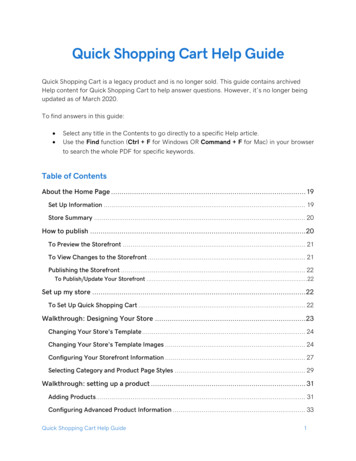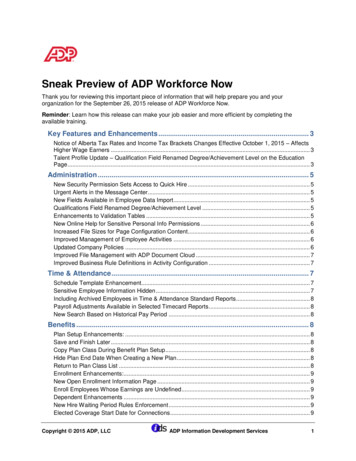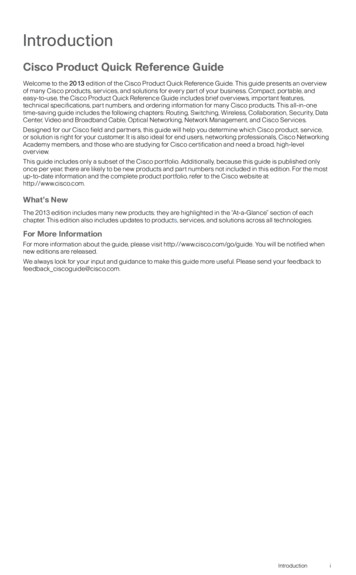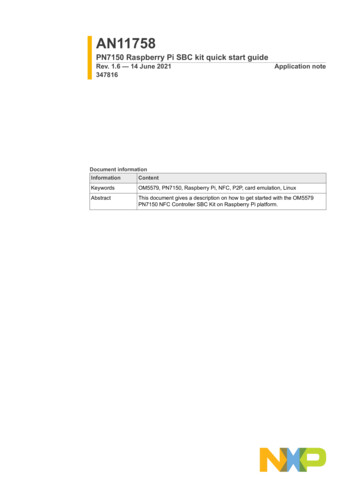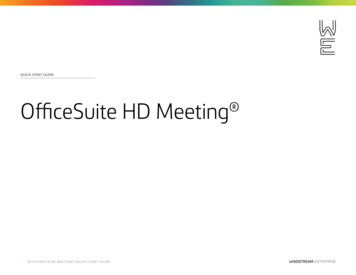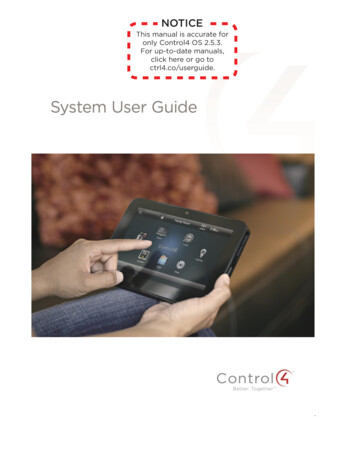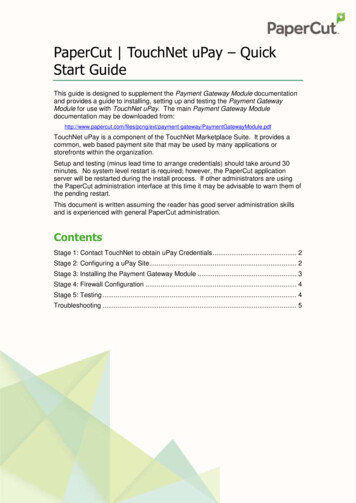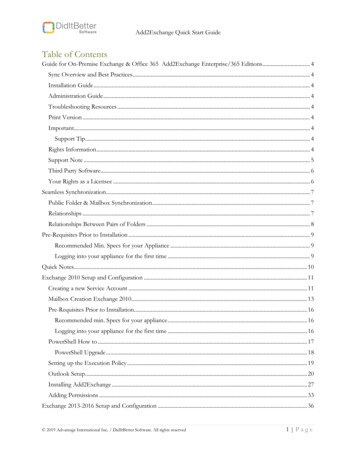
Transcription
Anna’s Guide To Forex Trading Copyright 2010 Anna CoullingA QUICK STARTGUIDE TOFOREX TRADINGTake your first steps toforex trading successLearn from someone who trades full time, and who willteach you that failure, is nature’s way of preparing youfor great success.!Visit My Blog at www.annacoulling.com1
Table of ContentsAbout the Author!!!!!IntroductionKeep It SimpleTake The Right ActionTips For Learning QuicklyLet’s Start With The BasicsWhat Is Forex TradingWhy Do We Have a Forex MarketWho Are the Main ParticipantsMarket MakersMultinationalsSpeculatorsCentral BanksRetail TradersHow Are Prices DerivedWhere Do I Fit In?!Visit My Blog At: www.annacoulling.com!2
TABLE OF CONTENTSIt’s Not About the MoneyThe Psychology of FailureHow Do We Measure SuccessForecasting SuccessTechnical AnalysisSimple Moving AveragesSupport & ResistanceTrend LinesFundamental AnalysisMarket MomentumNow It’s Up to YOUFX GlossaryTrading AxiomsDisclaimer & Copyright!Visit My Blog At: www.annacoulling.com!3
ABOUT MEI placed my first trade in 1996 and can remember it to this day, indeedI even have the details of the trade, as in those days we had to keepmanual records. Funnily enough it was not in the forex market, but infutures, a different market in many ways, but one which provided anexcellent grounding in the essential skills you need to develop in orderto become a successful forex trader in the longer term.Since then, I have traded in a variety of markets, and made manymistakes along the way, but have survived, which although painful atthe time, has helped me become a better trader, as a result. I now writeextensively on the markets in general, and the forex markets inparticular, which has since become my speciality, and I hope that byreading this short guide to getting started in forex, that I can help youavoid some of the mistakes that I made in the early years, and speed upyour learning curve as a result.In addition to writing and trading, I also mentor a small number ofstudents each year, but places are severely limited in order to ensurethat I can dedicate the time needed to provide the one on oneguidance tailored to each student’s needs. If you are interested inbecoming a student in the future, then please just drop me a line at mypersonal web site www.annacoulling.com and I will keep in touchshould space become available.!Visit My Blog At: www.annacoulling.com!4
ABOUT MEIn the meantime I also hold regular webinars where I give my views onthe forex markets and take a look ahead, both from a technical andfundamental perspective. These are free and available to myreadership, and by downloading this guide, you will receive details indue course, so I look forward to welcoming you to the next webinar. Inaddition I also have a home study course available on video, whichteaches you in simple stages how to get started, the key steps you needto follow to be successful, and some of my simple trading strategiesand tips that I have learnt over the years.Finally, and in order to provide help to get you started more quickly, Ialso host live forex trading webinars where we place trades, analyse themarket opportunities at the time, and look at placing both intra dayscalping trades, along with longer term positions to take advantage ofany developing trend. These are available by monthly subscriptiononly, but with an easy in, easy out option, and you can find furtherdetails of this service at www.annacoulling.comSo, let’s get started with this quick guide to forex trading, as I beginto teach you the basics of what you need start your own journey ofdiscovery in the forex trading world.!Visit My Blog At: www.annacoulling.com!5
INTRODUCTIONFirst of all thank you for downloading the “Quick Start Forex TradingReport”. You have made an excellent decision because I am going toshow you how to get started in forex trading, and if you follow thesetechniques and strategies, I hope in due course, this will give you thefollowing: More income More free time Less stressMy trading techniques are, in essence, very simple, so if you arelooking for a complex and perhaps a robotic approach to becoming asuccessful forex trader, then this document is not for you, as myphilosophy throughout my life, whether in business or trading, hasbeen to keep things simple. KISS - Keep it Simple, Stupid!!Visit My Blog At: www.annacoulling.com!6
KEEP IT SIMPLEI have found over the years, that the best results come from having asystem that is easy, and works. In my travels around the trading floorsof Europe, attending seminars, reading some of the hundreds ofbooks widely available, and in the many workshops and courses nowavailable, this has simply reinforced my view.Trading success is about two things. Simplicity and belief in yoursystem. The trading strategies and techniques in this report are theones I use myself every day in the forex markets, but they areessentially uncomplicated, and I make no apology for this.I do not believe in ‘black box’ solutions, which are becomingincreasingly common, and indeed are beginning to dominate themarkets to such an extent that we often see these effects in marketprice movements as we hit key levels or price bands. In my opinionthere is no substitute for making your own trading decision based onyour analysis of the prices and the underlying fundamental picture.If you are wrong, then you are wrong, short and simple, as making aloss is part and parcel of becoming a trader, and it is how you managethese losses which will ultimately dictate your success. So take controlof your decision making from the start, and do not abrogateresponsibility to the latest software robot which may work for a shorttime, before failing in the longer term.My trading techniques are based on chart analysis, backed by my viewof the broader fundamentals and market sentiment, which provide theframework against which the markets move each and every day, and itis I who make the decision to trade - no one else.!Visit My Blog At: www.annacoulling.com!7
TAKE THE RIGHT ACTIONIn life, I have found that a small percentage of people are action takers,and it is no surprise that these are the people who ultimately becomesuccessful traders. If you read something in this document that strikesa chord with you, then make a note of it and take action. It is almostimpossible to fail if you take the right action as opposed to DOINGnothing, which sadly will be the case for many, and forex trading is nodifferent.The noise of the market can be deafening, and when coupled with theinformation and analysis now available online, can be overwhelming,so in order to help you get started I have put together a simple actionlist on the last page of this report, highlighting key actions that Ibelieve you need to take and why.!Visit My Blog At: www.annacoulling.com!8
TIPS FOR LEARNING QUICKLYIf you are new to forex trading, it may seem daunting when you firststart, and you will almost certainly feel overwhelmed. This is perfectlynormal, and indeed was how I first felt when I started trading all thoseyears ago. There just seems to be so much information, so manydifferent ‘experts’, systems, strategies, tips, techniques andmethodologies, that it sometimes seems easier just to give up, andlook elsewhere. Indeed, as someone involved in the industry, even Iget confused and distracted by some new approach to the market, orthe latest technical innovation on my trading platform. The key is totake one small element at a time, and concentrate on this until you feelcomfortable, and then to move on to the next piece of the puzzle whichis the forex market.Learning to trade is like any other skill, it has to be broken down intoits key components, which you learn individually, before rebuildingthe whole picture and adding each element back into its correct place.If you think of it in much the same way as any other course, this will bebroken down into various modules, which you then study, beforemoving on to the next one. This is the approach I advocate for alltypes of trading, but particularly in forex, which is relatively new.If you are working full time, then this is even more important as yourtime will be limited, so you need to break the task down into smallmanageable topics which you can then study in bite size, beforemoving on to study the next element. A few hours each evening willsoon build up your knowledge.!Visit My Blog At: www.annacoulling.com!9
TIPS FOR LEARNING QUICKLYThis is the opposite of most people’s approach which is to open ademo trading account with as many brokers as possible, place practicetrades, make huge amounts of ‘virtual’ money very quickly, and thenbe fooled into thinking they are ready to trade. Spending hourswatching the markets will not teach you anything at this stage, (despitewhat you may think) - there is a time and place for this, but not at thestart of your forex trading journey.!Visit My Blog At: www.annacoulling.com!10
LET’S START WITH THE BASICSI make no apology by starting with the basics as these are the buildingblocks of your knowledge, so let me start by answering the five mostasked questions in forex trading which are as follows : What is forex trading Why do we have a forex market Who are the the main participants How are prices derived Where do I fit in!Visit My Blog At: www.annacoulling.com!11
WHAT IS FOREX TRADING?Forex trading is short for foreign exchange trading and, assuch,represents the market in which one country’s currency is quotedagainst that of another, and therefore provides the basis for theexchange of one currency with another, or to agree a rate for anyfuture purchase. Without these market rates being quoted, partieswanting to exchange their currency, would be forced to agree a ratefor each contract on an individual basis.An interesting feature of the forex market is that it has no centralizedexchange, such as in stocks or futures, and as a result all trading isconducted over the counter (OTC) which simply means that it is notconducted in a regulated environment, and indeed is often referred toas ‘off exchange’ trading. The forex market allows businesses,investors and traders to take advantage of the change in currency ratesby taking a view as to the likely future direction of one currencyrelative to another. As a result all currency rates are quoted in pairs.!Visit My Blog At: www.annacoulling.com!12
WHY DO WE HAVE A FOREX MARKET?The primary purpose of the forex market is to provide an easy andstraightforward way for companies to conduct international trade,allowing businesses to convert from one currency to another easilyand quickly. If, for example, a US based company is importing goodsfrom the UK, they can then pay for those goods in the currency of theexporter, in this case the British Pound, and the forex market wouldprovide the relevant exchange rate on the day of the transaction.Alternatively, the company may decide to fix the future rate in advanceby buying the exchange rate on a forward contract in order to avoidany currency fluctuations on the order.This, of course, can help to fix the price for the goods, but equally, thecompany may also lose out on potential savings should the currencyrate move in their favour. This is a judgement that each companymakes when dealing in the forex market, whether to fix a rate in thefuture, or to exchange at the current prevailing rates, with advantagesand disadvantages for both approaches. The modern exchange ratesystem of today was formed in the 1970’s when countries graduallymoved to free floating exchange rates from the previous fixed ratesystem where rates were pegged using an artificial system known asBretton Woods.!Visit My Blog At: www.annacoulling.com!13
WHO ARE THE MAIN PARTICIPANTS?In simple terms there are five broad groups of players in the forexmarket, each of whom has very different trading objectives andstrategies, and as such it is important to understand their role in orderto gain a deeper understanding of what drives prices, and why theforex markets react to the stream of daily news and analysis. The majorgroups are as follows, and we will look at each of these in turn indetail : Market makers Multinationals Speculators Central banks Retail traders!Visit My Blog At: www.annacoulling.com!14
MARKET MAKERSIn contrast to all the other participants in the forex market, marketmakers are the only ‘non customers’ and are there in order to providea service to their paying clients, and in general are the major retailbanks, with the big three of Deutsche Bank (20%), UBS (12%), andCitigroup (11%) continuing to dominate the market, with these threeaccounting for almost 45% of turnover on a daily basis.These international banks are the only organizations large enough tomanage the mutli billion dollar transactions involved in the corporateworld, and in effect create the market prices which are quoted on adaily basis. Now whilst it it is true to say that the above statement isgenerally correct, in the last few years we have seen the market makersmove way from their traditional role, and diversify into proprietarytrading themselves, as well as trading on behalf of their clients, alongwith offering retail brokerage accounts to the small trader andspeculator.This blurring of once traditional roles in the market is likely tocontinue as the profits to be made from trading in forex continues toincrease exponentially, and as such, an opportunity that these largebanks can no longer ignore. Of the three banks above, Deutsche is theonly one (to date) who currently offer a retail trading platform.!Visit My Blog At: www.annacoulling.com!15
MULTINATIONALSLarge corporate companies are the bread and butter of the forexworld, and in many ways are seen as the most logical players, requiringcurrency exchange for ‘real’ business purposes, such as paying forimports and receiving payments for exports, hedging future prices forlarge consumable items, and finally for major mergers andacquisitions. A well run finance department can save a large blue chipcompany millions of pounds or dollars a year, simply by ensuring thatpurchases and payments are either fixed, or made at optimum times tomaximize potential savings or additional profits, simply in thedifference between the two exchange rates, which are magnified as aresult of the volumes involved.As a general rule, corporates are relatively conservative in their buyingand selling decisions, and rarely speculate in exchange rates,preferring to fix rates and hence fix their costs or profits, rather thanspeculate on future exchange rates and run the risk of increased costs,forgoing ( generally ) the chance of increased profits.!Visit My Blog At: www.annacoulling.com!16
SPECULATORSThe third major group of forex participants are the speculators, and inmany ways these are the most interesting, and come in many shapesand sizes. Their primary aim is to make a profit from their analysis ofthe market, and they have no interest in acquiring real holdings of thecurrency, but simply ‘bet’ on which way the market is likely to move inthe future. The biggest players in this group include proprietarytraders ( banks trading their own money), hedge funds, commoditytrading advisors ( CTA’s) and currency overlay managers.These trading groups are high risk traders, betting large volumes andare happy to take on excessive leverage in order to make huge profits.Equally however, they are also subject to large losses, and it is thisgroup that is responsible for the majority of intraday moves in theforex markets.!Visit My Blog At: www.annacoulling.com!17
CENTRAL BANKSThe central banks of the world act as the administrators of the forexmarket, with each National Bank responsible for its own currency. Ingeneral, central banks do not like to see their currency being used forspeculative purposes, and as a result are not averse to stepping intothe market in order to manipulate its own currency in order to reduceharmful volatility which in turn could damage the reputation oreconomic stability of the country as a result.The Bank of Japan, for example, frequently intervenes in this way,particularly where any strength in the Japanese Yen is likely to damageJapanese exports, which in turn makes them more expensive tooverseas buyers. The role of the central bank is to manage monetarypolicy to ensure economic stability and to remove volatile currencyfluctuations.!Visit My Blog At: www.annacoulling.com!18
RETAIL TRADERSFinally we come to the latest group of traders in the forex market,which is, of course YOU and ME, and we could equally be classified assmall speculators, as we have no interest in holding the currency weare buying or selling, but are simply looking to make a profit from ouranalysis of the market. Unfortunately, we come at the bottom of this‘food chain’ and sadly, as a result, generally provide a constant, newsupply of funds to the bigger market players.!Visit My Blog At: www.annacoulling.com!19
HOW ARE PRICES DERIVED?The prices we see quoted on our screens every day come from oneprinciple source, but arrive in front of us in very different ways. Insimple terms it is the major retail banks outlined above who effectivelyset the central exchange rates, by virtue of their interbank trading, andthis is often referred to as the interbank liquidity pool. This group ofbanks, therefore, act as the central exchange for the forex market, andwhilst they are regulated as a bank, they are unregulated as far as theprovision of currency rates is concerned, and are able to influencemarket prices to suit their own investment and trading needs.Indeed, the nirvana for any bank is to earn income from what is called‘off balance sheet’, and this is where the forex market delivers inabundance, with millions in profit every day. All that is required is forthe bank to set up a forex dealing desk along with a proprietary tradinggroup, and fairly soon the money starts rolling into its coffers!So the interbank liquidity pool is the starting point for the market, andfrom here the rates are then delivered via a number of live feedsthrough a variety of channels. The most expensive live feeds comefrom three major providers, namely www.currenex.com, EBS andwww.fxall.com, and represent the professional end of the market, andare generally way beyond the budget and pocket of the small retailtrader, costing thousands of dollars a month.!Visit My Blog At: www.annacoulling.com!20
HOW ARE PRICES DERIVED?However, if you do trade using one of these, you will effectively betrading at the ‘central exchange’ along with the major banks, and willbe receiving the latest quotes, the tightest spreads and access to thedeepest pool of liquidity, as well as the ability to see the depth of themarket at any time - the equivalent of level 2 and level 3 data feeds inequity markets.Whilst it is possible for individual traders to subscribe to these feedsdirectly, it is much more likely that you will become a client of a brokerwho is using one of these feeds to provide live prices to their ownplatform, and this is the price you are likely to see quoted on yourtrading screen. However, it is important to note that as the broker isnow “making a market”, the price quoted by one broker may be verydifferent from that quoted by another, as each is able to present theprice they wish at any time.In addition, the price they quote may be very different from that beingquoted in the interbank market as many of these brokers are in facttrading against you, and along with market manipulation, laggingprices, and outright malpractice represents one of the manychallenges we face as forex traders every day. Some smaller brokersmay not even be able to afford to subscribe to these feeds directly orhave sufficient funds to establish their own platform and to meet theminimum capital requirements under the various regulatory rules.These brokers become known as ‘white label’ brokers for these largerbrokerage companies, in effect adding a further layer to the pricesquoted with all that this entails, removing the trader still further fromthe real price action in the interbank pool.!Visit My Blog At: www.annacoulling.com!21
HOW ARE PRICES DERIVED?The interbank liquidity pool is dominated by the following majorbanks, who between them control around 80% of the forex market : Deutsche Bank - 20 % fx market share UBS - 12% fx market share Citigroup - 11% fx market share Barclay's Capital - 7% fx market share RBS - 7% fx market share Goldman Sachs - 5% fx market share HSBC - 5% fx market share Bank of America - 4% fx market share JP Morgan Chase - 4% fx market share Merrill Lynch - 4% fx market share!Visit My Blog At: www.annacoulling.com!22
WHERE DO I FIT IN?Sadly, as small retail forex traders we are at the bottom of the heap,and are generally considered by the rest of the market as ‘fair game’both by the institutional banks and market makers, as well as by ourown brokers!The forex market is a voracious beast, which requires fresh moneyevery day, and with such huge sums being made it is no surprise that itoften attracts the worst kind of business practice and outrightprofiteering, which can leave the novice disillusioned and substantiallyless well off than when they started, and I hope from reading thisguide, and my many other trading resources and membership sites,that you will avoid many of the traps, set for the unwary.To succeed in the forex market you need to be consistent, and to beconsistent you need to have a clear plan, remain focused and removeemotion from your trading decisions. Believe it or not, trading is moreto do with psychology and the mind, and less to do with makingmoney. If you can manage your emotions, and forget about the moneythen you stand a chance.!Visit My Blog At: www.annacoulling.com!23
IT’S NOT ABOUT THE MONEY!Becoming a successful trader is not about the money, it’s abouttraining your mind to think of trading as an intellectual challenge ofunderstanding the markets - the money will follow. Forget aboutmaking money, and concentrate on the following - this is the startingpoint for all successful traders who ultimately do make a great deal ofmoney. The psychology of failure How do we measure success!Visit My Blog At: www.annacoulling.com!24
THE PSYCHOLOGY OF FAILUREAs individuals we are programmed from an early stage not to fail, andindeed failure is not an option for many of us. Teachers, parents,mentors, friends and family exhort us not to fail each and every day,and in our early childhood this is reinforced with exams, tests, andpeer pressure whether in the academic environment of the classroomor on the sports field.Failure is not an option, and indeed it is so ingrained into our earlyyears, this constant striving for success, that for many of us the fear offailure is our driving force, to such an extent that we lie, cheat, andhide the truth to avoid admitting that we have failed, whether in apersonal or business context. Now to put this into context, let me listsome of the greatest failures the world has known: Henry Ford - went bankrupt twiceRodin - failed to get into art schoolAbraham Lincoln - lost seven electionsEinstein’s Ph.d was rejectedEdison - 13 months of tests before the light bulb!Great failures - I don’t think so, but failures for them personally neverthe less. What marks them apart is their ability to move on, and toconsider these failures as a stepping stone towards their ultimate goal,and as such as much a part of success as success itself. No doubt at thetime, they felt deflated, and disappointed, but had the inner strengthto move on, and not dwell on these minor setbacks. Indeed, as one ofmy friends once said to me - “well if they can’t see your genius thenthat’s their loss!”!Visit My Blog At: www.annacoulling.com!25
THE PSYCHOLOGY OF FAILUREThis is the attitude you need to develop, this is not to say a cavalierapproach to failure, but almost to welcome failure as moving you astep closer to a positive result. Indeed in marketing, when cold calling,each rejection is viewed as an increasing likelihood of the next callbeing successful. It is the numbers game, and provided you are able tomanage your losses, and control your emotions, then this is how youneed to view each and every trade.Any losing trade is not a failure, it is simply a step towards a morepositive result. Failure is giving up when you are down and not gettingback up again - anything else is simply part of the process ofsucceeding and as such should be seen as small victories, as you havethen learnt the art of accepting these for what they are, moving on, andkeeping going fueled by your own self belief and determination.!Visit My Blog At: www.annacoulling.com!26
HOW DO WE MEASURE SUCCESS?Ask yourself this question - does a sportsman or sportswomanmeasure success in terms of the money made or the medals and cupswon? The simple answer is no, and no doubt many would swap asignificant part of their income for a gold medal or a world record,which would cement their place in history, even if only for a shortperiod of time. Success in career terms, has more to do with theposition held, and the pleasure in having worked so hard to achieveresults and recognition, rather than the monetary rewards alone.For a pilot a successful flight is one that lands safely, for a doctor asuccessful operation is one that involves a complete recovery for thepatient, and a successful marketing campaign is one that gets themessage across to potential clients - all very different measures ofsuccess.Success in the context of trading the markets is measured in thepleasure of forecasting the market move correctly, not in the money.You may find this hard to believe, and may have to read this sentenceagain, but this is a fact, and it is how I trade. When I am analysing themarket I am not particularly interested in the money, rather the mentalchallenge of trying to understand the future direction of the market.When I am right I am delighted and I enjoy the feeling of success thatthis gives me. Indeed as I am writing, I have just placed a short tradeon the euro dollar, following a strong bearish signal on the hourlychart. Several hours later the market sold off strongly, so I was correctin my analysis, and am delighted as I was sure that it would fall. Yes, Ihave made money, but the greater pleasure comes from a successfultrade but perhaps not in the way you would expect.!Visit My Blog At: www.annacoulling.com!27
HOW DO WE MEASURE SUCCESS?I know that there are many, many rules, sayings, quotes, old wivestales, strategies, techniques, black box solutions, magic signals, andall sorts of ‘secret’ techniques to help you become a successful trader.However, in my view, the above advice is worth all of them puttogether. Forget about the money and measure success as beingcorrect in your market analysis. Frankly, I could trade with no moneyat stake, and still get pleasure from providing my readers with ananalysis that is right - so forget the money, it will come in due course.!Visit My Blog At: www.annacoulling.com!28
FORECASTING SUCCESSThere are three elements required to become successful at forecastingmarket direction and these are as follows : Technical analysis of the various price/time charts Fundamental analysis of the worldwide and country specificeconomic data Market momentumOf the three topics listed above, the first two can be taught and learntwith practice, but the third is based on intuition and instinct, and isalmost impossible to teach. Put simply, it is your intuition that will tellyou whether a particular market move will develop and gathermomentum. You will come to recognize whether the market is likelyto move higher or lower.It is hard to describe this feeling, but feel it you will, once you begin tostudy charts on a daily basis and watch how market moves develop andevolve. The problem, of course, is that you can never be sure, assometimes the moves are simply the large institutions moving themarket for their own ends. However, combine a strong, reliabletrading signal with your instinct and overall analysis and you will havea powerful weapon.!Visit My Blog At: www.annacoulling.com!29
TECHNICAL ANALYSISThere are hundreds, if not thousands of books, that have been writtenabout various aspects of technical analysis, and I cannot possibly hopeto cover the subject in a few short paragraphs here. However, what Ican do, hopefully, is to guide you through the subject and to providesome pointers as to what I believe are the most important aspects ofthis key area, which I hope will help you in getting started a littlequicker.Put simply, technical analysis is based on the principle that in lookingat a chart of price and time, then the chart contains all the views of allthe market players condensed in one place, in the form of a chart. It is,if you like, much like a cake, where all the ingredients are mixedtogether to produce a cake where the sweet and sour blend together inthe finished product.On a chart, all the views of the bulls and bears are clearly visible andconsolidated into a single price, which also includes all thefundamental and economic data within the price action. Now thecorollary to this is, that if all market participants are looking at thesame chart and the market makes a sudden move, is this the market orthe fact that all the players have seen the same signal?!Visit My Blog At: www.annacoulling.com!30
TECHNICAL ANALYSISWithin the broad topic of technical analysis there are many manydifferent types of chart styles and indicators, and the first place to startis with a simple book on Japanese candlesticks, which are nowconsidered to be the de facto standard for presenting price actionusing solid ‘candles’.These provide meaningful and instant signals and once you begin torecognise various patterns they will give you clues as to the likelyfuture
Forex trading is short for foreign exchange trading and, as such,represents the market in which one country’s currency is quoted against that of another, and therefore provides the basis for the exchange of one currency with another, or to agree a rate for any future p

